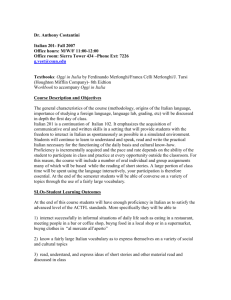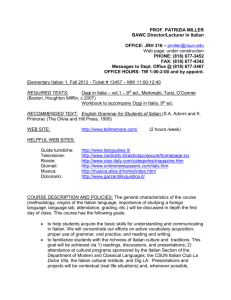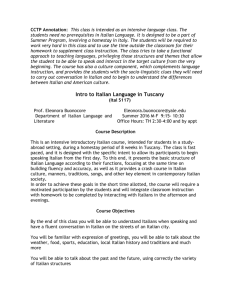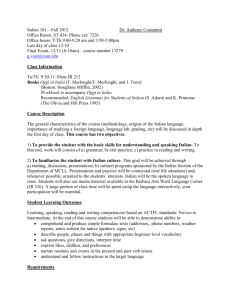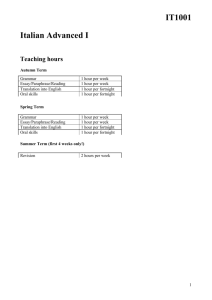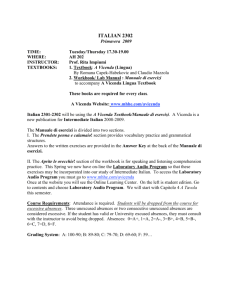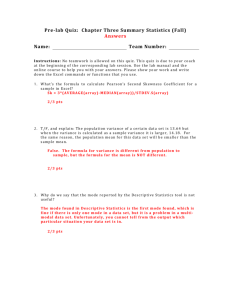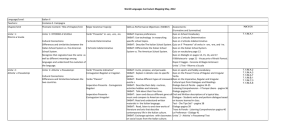Italian 102 Syllabus
advertisement
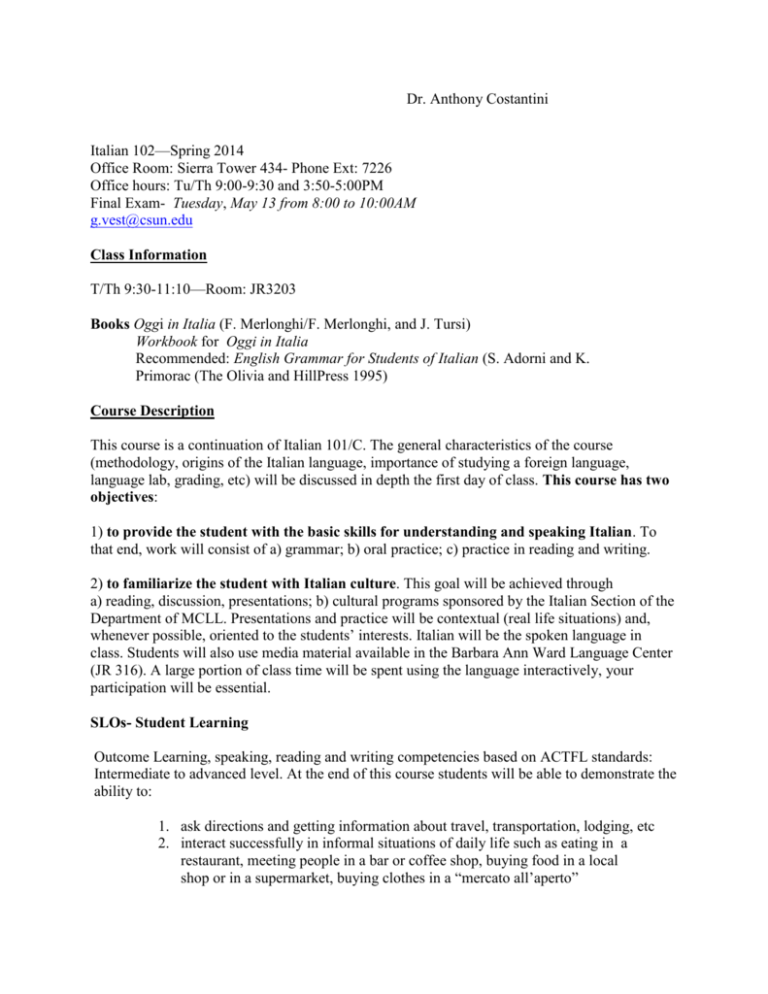
Dr. Anthony Costantini Italian 102—Spring 2014 Office Room: Sierra Tower 434- Phone Ext: 7226 Office hours: Tu/Th 9:00-9:30 and 3:50-5:00PM Final Exam- Tuesday, May 13 from 8:00 to 10:00AM g.vest@csun.edu Class Information T/Th 9:30-11:10—Room: JR3203 Books Oggi in Italia (F. Merlonghi/F. Merlonghi, and J. Tursi) Workbook for Oggi in Italia Recommended: English Grammar for Students of Italian (S. Adorni and K. Primorac (The Olivia and HillPress 1995) Course Description This course is a continuation of Italian 101/C. The general characteristics of the course (methodology, origins of the Italian language, importance of studying a foreign language, language lab, grading, etc) will be discussed in depth the first day of class. This course has two objectives: 1) to provide the student with the basic skills for understanding and speaking Italian. To that end, work will consist of a) grammar; b) oral practice; c) practice in reading and writing. 2) to familiarize the student with Italian culture. This goal will be achieved through a) reading, discussion, presentations; b) cultural programs sponsored by the Italian Section of the Department of MCLL. Presentations and practice will be contextual (real life situations) and, whenever possible, oriented to the students’ interests. Italian will be the spoken language in class. Students will also use media material available in the Barbara Ann Ward Language Center (JR 316). A large portion of class time will be spent using the language interactively, your participation will be essential. SLOs- Student Learning Outcome Learning, speaking, reading and writing competencies based on ACTFL standards: Intermediate to advanced level. At the end of this course students will be able to demonstrate the ability to: 1. ask directions and getting information about travel, transportation, lodging, etc 2. interact successfully in informal situations of daily life such as eating in a restaurant, meeting people in a bar or coffee shop, buying food in a local shop or in a supermarket, buying clothes in a “mercato all’aperto” 3. narrate their experiences had in a foreign country or simply visiting other parts of the United States 4. express likes, dislikes, and preferences 5. communicate in Italian through a fairly large active vocabulary Requirements There will be regular assignments consisting of grammatical exercises and cultural reading in context with each chapter treated. You will be required to complete the exercises in the Workbook as well as handouts as assigned. As an integral part of your class assignments, you will be required to follow the “Tell me more” program and to use our tutorship service at the Barbara Ann Language Center as indicated. Details on tutorship will be presented in class. Class attendance is mandatory. It is the University policy that if you miss more than three classes without proper justification, your grade will be lowered one letter grade (“A” will be changed to “B,” etc). Repeated later arrival will count as partial absences. Grade Distribution Grading will be both objective (attendance, homework, quizzes, exams, etc.) and subjective (effort, participation, progress, etc.). Grades will be determined based on the following: quizzes 25%; midterm 25%; final 25%; homework, attendance, class participation, completion of the “Tell Me More Program,” tutorship 25%. Quizzes and exams While quizzes will concentrate more on the grammatical unit or units studied, midterm and final will cover the activities of listening, reading, and writing. The percentage of each activity will be spelled out in the exam. If necessary one quiz may be devoted only to activity of listening and answering questions. Helpful web sites http://www.virgilio.it http://www.cyberitalian.com http://www.abacroma.com Class etiquette Absolutely no cell activity during class. Unacceptable or negative behavior involves always asking teacher and classmate; moving around and going out to make phone calls; not paying attention to the teacher and acting bored as you were not part of the class; stretching your legs to occupy two seats; eating or munching; getting up to throw a piece of paper in the trash can or sharpening a pencil. Outline of Course Content: Week 1/2/3: Review of grammatical and conversational material of Italian 101/C- Homework material will be handed in class. Week 4: First Quiz- Lezione sette: Verbi riflessivi (160-163) - From now on, homework material will be related to each grammatical unit studied and present in both the Textbook and the Workbook. Week 5: Second Quiz - Imperativo informale (163-166)- (Skip Imperativo formale on p. 167). Partitive (169-170)Week 6: In giro per l”Italia (173-175)- Lezione 8: Una cena in famiglia (177) Vocabolario(178)-La famiglia italiana (179)-Pronuncia (180)- Ampliamento del vocabolario (180-181)- Lei viaggia (182)-: Dovere/Ptoere/Dovere (184-186)Week 7: Pronomi diretti (186-190)- (Skip Aggettivi e pronomi dimostrativi) –Parliamo un po’ (193-194)- Third Quiz Week 8: In giro per l’Italia (104-197)- Lezione 9: Un anno all’estero (199-200)- Vocabolario (200)- Pronuncia (202)- Ampliamento del vocabolario (203)- Alcune espressioni di tempo con “ogni, volta, etc (205)- Imperfetto (206-209)Week 9: Midterm- Espressioni negative (210-212)- Pronomi personali tonici (213-214)Week 10: Lezione 10- Ad una mostra cinemtografica (220-221)- Vocabolario (222)- Il cinema italiano (223)-Pronuncia (224)- Ampliamento del vocabolario (225)- Contrasto tra l’imperfetto e il passato prossimo (228-231)Week 11: Plurale di alcuni nomi e aggettivi (231-233)- Sapere e conoscere (234-236)In giro per l’Italia 239-243). Fourth Quiz – Week 12: Lezione 11: La settimana bianca (245-46)- Pronuncia (248-249)- Ampliamento del vocabolario (250-251)- Oggetti personali utili (252)- Pronomi indiretti (253-257)- Costruzioni con piacere (257-260)Week 13: Verbi riflessivi con significato di reciprocità (260-262)- In giro per l’Italia (266-268)Lezione 12: Chi gioca? (270-271)- Vocabolario (272)- Pronuncia (273-274)Ampliamento del vocabolario (275-276)- Fifth Quiz Week 14: Futuro semplice (276-280)- (Skip Trapassato)- Il pronome “ne” e l’avverbio “ci”(283-286)- Lezione 13: Cento di questi giorni (292-293)Week 15: Vocabolario (294)- Ampliamento del vocabolario (296-297)- Condizionale (298-300)Review- FINAL
